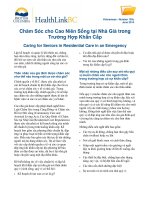EPIRB USERS MANUAL PHAO BÁO VỊ TRÍ TRONG TÌNH HUỐNG KHẨN CẤP
Bạn đang xem bản rút gọn của tài liệu. Xem và tải ngay bản đầy đủ của tài liệu tại đây (711.93 KB, 12 trang )
User Manual
EPIRB
Vox Maris
GMDSS Simulator
Vox Maris is a technical training tool. It is a PC-based simulator to train sea-faring
people in the use of GMDSS communications equipment, within a controlled and
safe environment.
Vox Maris simulates the functionality of marine radio and satellite communications
equipment according to the operational norms determined by The International
Telecommunication Union. It also emulates real conditions of the marine radio
communications such as noises, attenuation by distance in terrestrial and
ionospheric propagation, and different types of sound effects from communication.
Contents
I
Index
Ch. I
Ch. II
Introduction
2
1 Application...................................................................................................................................
2
2 Registration
...................................................................................................................................
2
3 How does ...................................................................................................................................
the system work?
3
4 Activation ...................................................................................................................................
4
Components - Funcionality
7
© 2009 Advenio Software S.R.L.
I
Chapter I
Introduction
Introduction
1
2
Introduction
The COSPAS - SARSAT is a service of polar-orbiting satellites through which are
received and relayed distress alerts from satellite EPIRB determining the location of
these.
An EPIRB (Emergency Position Indicating Radio Beacon) has the capacity to transmit a
distress alert through the service of polar-orbiting satellites working in the 406 MHz or,
if the vessel is dedicated to travel within the scope of Inmarsat system coverage,
through the service of Inmarsat geostationary satellites working in the 1.6 GHz.
An EPIRB must be:
·
·
·
·
1.1
installed on the ship in an easily accessible place
ready to be manually released and be transported by a person to a survival craft
able to escape and float if the ship is sinking, automatically activated when it is afloat
able to activate it manually
Application
This EPIRB (Emergency Position Indicating Radio Beacon) is designed for use in
maritime emergencies, and is approved for these contingencies. Use it only in situations
of grave and imminent danger. Intentional false alerts may result in penalties.
1.2
Registration
This EPIRB must be registered with the appropriate national authority.
Failure to register may slow the rescue and lead to loss of life.
Every EPIRB is pre-programmed with a unique identity before it reaches the customer.
This is done by the manufacturer or, in some cases, the distributor. The identity
includes a 3 digit country code. This is the country that takes responsibility for storing
that particular EPIRB’s registration details. In most cases this is the country to which
the vessel is flagged. The country programmed into your EPIRB can be found from its
rear identity label. You must register with this country.
The label also contains the Vessel name, the unique identification number (ID), the
serial number (S/N) and MMSI.
When you activate your EPIRB in an emergency, the nearest maritime search and
rescue coordination centre (MRCC) will receive the message and decode the country
© 2009 Advenio Software S.R.L.
3
Vox Maris GMDSS - EPIRB
code (eg 701 Argentina). They will then access the registration database for that
country and expect to find details of your vessel, its radio equipment and who to
contact. If they fail to find this information, this may slow down any rescue.
How to register an EPIRB
Three registration forms are provided, two are for future use and one must be
completed immediately. These forms are pre-printed with your EPIRB’s identity; all you
have to do is complete details of your vessel and provide contact numbers. Wherever
possible the forms are also pre-printed with the correct mailing address and a faxback
number. If your form does not have a mailing address, contact your supplier. When you
have completed the form, you can choose to fax it or mail it.
1.3
How does the system work?
The picture below shows the operating fundamentals of EPIRBs - COSPAS / SARSAT
system.
1
In an emergency situation, the EPIRB is activated in manually or
automatically mode.
2
The EPIRB transmits an "emergency code" and activates the strobe
light indicating that is in operation.
3
The signal is received by a COP-SARSAT satellite and is sent to the
nearest station.
4
The station calculates the EPIRB location and decrypts the
identification code.
© 2009 Advenio Software S.R.L.
Introduction
1.4
4
5
The central rescue station uses the identification code to determine the
type of ship, its owner, size and contacts for emergencies. The Rescue
Centres are contacted and alerted to start the rescue operation.
6
SAR organisms locates the EPIRB using the information of the exact
position, the signal emitted 121.5 MHz and the strobe light.
Activation
In an emergency:
· Remove the EPIRB completely from its bracket or enclosure.
· Hold the lanyard spool and throw the EPIRB into the water where it will self-activate.
OR
· If time permits, pull the tear-off tab up, then press the activation button and slide the
switch left.
© 2009 Advenio Software S.R.L.
5
Vox Maris GMDSS - EPIRB
OR
· Held down the Test button for 20 seconds.
© 2009 Advenio Software S.R.L.
Chapter II
Components - Funcionality
7
2
Vox Maris GMDSS - EPIRB
Components - Funcionality
The EPIRB is a powerful self-contained distress transmitter. It is powered by a Lithium
battery that has a replacement interval of 5 years. An EPIRB is intended to be a
one-shot device; once activated it will operate for at least 48 hours. It operates best
while floating in water, but it can also be operated while on board a vessel or in a
liferaft.
The key components of an EPIRB are:
Antenna
This is a flexible whip. It must be near vertical when operating.
Strobe light
These are the bright white LEDs visible through the clear lens dome. When the EPIRB is
activated they will flash every few seconds.
When the EPIRB is activated the strobe will start to flash immediately, but the EPIRB
will not make any distress transmissions for 50 seconds. This gives you a chance to
turn off if you activated it accidentally. During this time the red LED illuminates
continuously. When the red LED starts to flash, the 50 seconds delay has passed and
distress transmissions have started.
Red LED
Visible through the clear lens dome at the rear of the EPIRB. This stays on or flashes to
show which mode the EPIRB is in.
Green LED
Where fitted (beside the red LED), this flashes when the GPS acquires a position fix.
Sea switch
The two studs on the sides of the EPIRB are sea switch contacts. Submerge these in
water to activate the EPIRB automatically.
© 2009 Advenio Software S.R.L.
Components - Funcionality
8
Activation Switch
This slide switch is protected against accidental activation by a red tear-off seal.
The EPIRB can be activated manually pulling the tear-off tab upwards to release the
switch, then push the switch in and move it fully left.
ð
ð
Test
This button enables the user to run test sequences to verify the readiness of the EPIRB.
As an important item of safety equipment, your EPIRB should be checked regularly. The
EPIRB has a built-in test capability that can be used as a confidence check. This
self-test confirms that the battery is healthy, that the GPS receiver and both distress
© 2009 Advenio Software S.R.L.
9
Vox Maris GMDSS - EPIRB
transmitters are functional and that the strobe light is operational. The self-test should
be performed monthly, but not more frequently.
To do this, perform the following steps:
· Press the TEST button until the red LED lights, then release the button.
· The EPIRB will test its internal components and then make test transmissions at
121.5 and 406 MHz monitoring the transmitter output.
· If all tests are successful, the buzzer will sound and the red and white strobe LEDs
will flash together a number of times.
· If any test is unsuccessful, nothing will flash and the red LED will go out.
This button also allows the activation of the EPIRB, if held down for 20 seconds.
Lanyard
Pull the lanyard spool down to free it. Use the cord to tether the EPIRB to a survival
craft.
© 2009 Advenio Software S.R.L.









